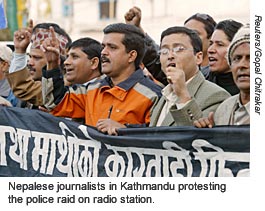New York, November 28, 2005—The Committee to Protect Journalists today condemned a police raid on Radio Sagarmatha moments before the independent station was to relay a rare BBC interview with the head of Nepal’s Maoist rebels. Police stormed the community FM station in the capital Kathmandu on Sunday evening, shut it down, confiscated equipment, and arrested four journalists and a technician, station manager Ghamaraj Luitel told CPJ.
Officials delivered two letters from the government, one ordering the station to stop broadcasting immediately because it was “helping terrorists and terrorism,” and another authorizing the seizure of BBC relay equipment, Luitel said.
Radio Sagarmatha (Mount Everest Radio) was scheduled to broadcast the BBC Nepali Service news, which included an exclusive interview with rebel chief Prachanda, his first radio interview in a decade. In the interview, the elusive leader offered to reexamine the role of the monarchy if elections for a constituent assembly were held, the BBC said. Prachanda’s comments confirm a recent softening of the rebels’ stance towards the monarchy. The government had always opposed the idea of a constituent assembly but the change in tone by the rebels might allow it to rethink its position, the BBC said.
Security forces prevented seven other radio stations with BBC relay rights from broadcasting the interview, Laxman Upreti, Radio Sagarmatha chairman, said. The eight stations had been allowed to transmit the BBC Nepali service despite a ban on FM radio news bulletins, introduced as part of a crackdown on independent media introduced since King Gyanendra seized absolute power in February.
“Not only is the government seeking to silence the critical local media but it is also trying to block foreign sources of news, tactics of a regime that is determined to keep the population in the dark,” said CPJ Executive Director Ann Cooper. “We call on the King to return Radio Sagarmatha to the air waves immediately and lift other restrictions on the media.”
Police released the radio station’s five staffers after protests by local journalists and international groups including UNESCO.
Radio Sagarmatha asked the Supreme Court today for an interim order that would allow it to resume broadcasts. The station will remain off the air until the court decides or the government lifts the ban, Luitel said. The court could begin hearing the case as soon as Tuesday.
Earlier this month, the Supreme Court refused to issue an interim order that would have stayed the government closure of Kantipur FM on October 21. An influential voice of the independent media, Kantipur was the first target in the enforcement of an October media ordinance, which banned the broadcasting of FM radio news.
![]()
